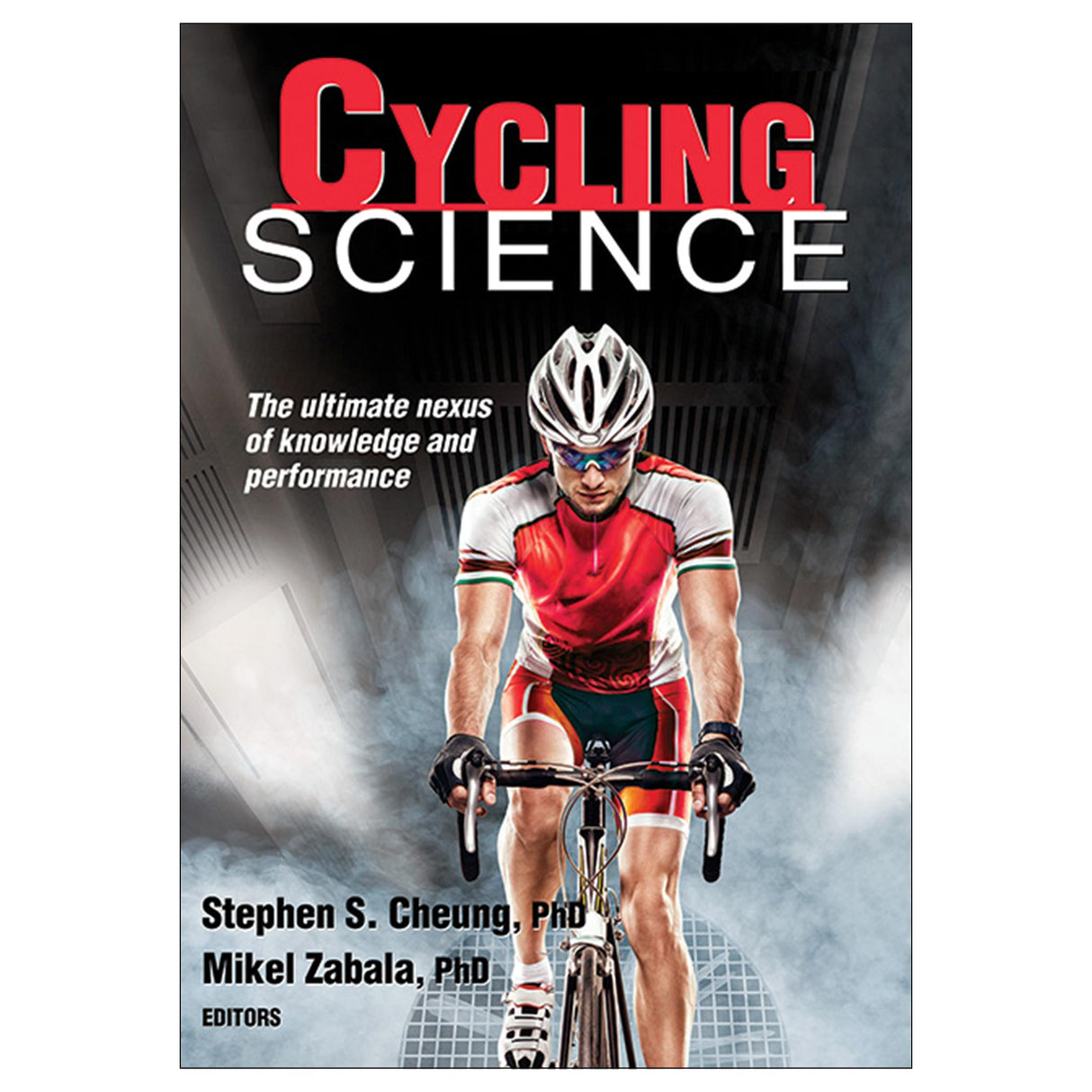Cycling Science
Author: Stephen S. Cheung, Mikel Zabala
$29.95 CAD
Finally, the authoritative resource that serious cyclists have been waiting for has arrived. The perfect blend of science and application, Cycling Science takes you inside the sport, into the training room and research lab, and onto the course.
A remarkable achievement, Cycling Science features the following:
- Contributions from 43 top cycling scientists and coaches from around the world
- The latest thinking on the rider-machine interface, including topics such as bike fit, aerodynamics, biomechanics, and pedaling technique
- Information about environmental stressors, including heat, altitude, and air pollution
- A look at health issues such as on-bike and off-bike nutrition, common injuries, fatigue, overtraining, and recovery
- Help in planning training programs, including using a power meter, managing cycling data, off-the-bike training, cycling specific stretching, and mental training
- The latest coaching and racing techniques, including pacing theories, and strategies for road, track, MTB, BMX, and ultra-distance events
In this book, editors and cycling scientists Stephen Cheung, PhD, and Mikel Zabala, PhD, have assembled the latest information for serious cyclists.
Part I. The Cyclist
Chapter 1. The Cyclist’s Physique
Paolo Menaspà and Franco Impellizzeri
Chapter 2. Cycling Physiology and Genetics
Stephen S. Cheung
Part II. The Bike
Chapter 3. Bicycle Design
Larry Ruff
Chapter 4. Frame Materials and Geometry
Larry Ruff
Chapter 5. Saddle Biomechanics
Daniel Schade
Part III. The Human–Machine Interface
Chapter 6. Biomechanics of Cycling
Rodrigo Rico Bini
Chapter 7. The Science of Bike Fit
Rodrigo Rico Bini
Chapter 8. Bike Fit and Body Positioning
Todd M. Carver
Chapter 9. The Aerodynamic Rider
Andy Froncioni
Chapter 10. Pedaling Technique and Technology
Thomas Korff, Marco Arkesteijn, and Paul Barratt
Part IV. The Cycling Environment
Chapter 11. Dealing With Heat Stress
Stephen S. Cheung
Chapter 12. Air Pollution and Cyclists
Mike Koehle and Luisa Giles
Chapter 13. Altitude and Hypoxic Training
Randall L. Wilber
Chapter 14. Tackling the Hills
Hunter Allen
Part V. Nutrition and Ergogenics
Chapter 15. Cycling Nutrition
Dina Griffin
Chapter 16. Feeding During Cycling
Dina Griffin
Chapter 17. Hydration Science
Stacy Sims
Chapter 18. Doping’s Dark Past and a New Cycling Era
Mikel Zabala
Part VI. Cycling Health
Chapter 19. Epidemiology of Cycling Injuries
Victor Lun
Chapter 20. Managing Common Cycling Injuries
Victor Lun
Chapter 21. Fatigue and Overtraining
Romain Meeusen and Kevin De Pauw
Chapter 22. Recovery Interventions
Shona L. Halson and Nathan G. Versey
Part VII. Training Development and Assessment
Chapter 23. Long-Term Athlete Development
Kristen Dieffenbach
Chapter 24. Psychological Strategies for Team Building
Javier Horcajo and Mikel Zabala
Chapter 25. Motivation and Mental Training
Jim Taylor and Kate Bennett
Chapter 26. Assessing Cycling Fitness
James Hopker and Simon Jobson
Chapter 27. Designing Training Programs
Paul B. Laursen, Daniel J. Plews, and Rodney Siegel
Chapter 28. Training Periodization
Bent R. Rønnestad and Mikel Zabala
Chapter 29. Using a Power Meter
Hunter Allen
Chapter 30. Data Management for Cyclists
Dirk Friel
Part VIII. Preparing to Race
Chapter 31. Off-the-Bike Training
Bent R. Rønnestad
Chapter 32. Respiratory Training
A. William Sheel and Carli M. Peters
Chapter 33. Warming Up
Jose M. Muyor
Chapter 34. Stretching
Jose M. Muyor
Part IX. Racing Your Bike
Chapter 35. The Science of Pacing
Chris R. Abbiss
Chapter 36. Road Racing
Hunter Allen
Chapter 37. Mountain Biking
Howard T. Hurst
Chapter 38. Track Cycling
Chris R. Abbiss and Paolo Menaspà
Chapter 39. BMX
Manuel Mateo-March and Cristina Blasco-Lafarga
Chapter 40. Ultradistance
Beat Knechtle and Pantelis Theodoros Nilolaidis
"Cycling Science combines Stephen Cheung's immense knowledge about aerodynamics and training with the findings of the sport's top researchers and experts. If you want to know what it takes to ride faster, this is the book for you."
—Daniel Lloyd, Presenter at the Global Cycling Network, Former professional cyclist
"Cycling Science taps the leading minds in cycling training, fitness, and technology. A landmark work, it's beyond comprehensive and a must-have for anyone who wants to truly understand our amazing sport."
—Selene Yeager, USA Cycling certified coach, Bicycling magazine columnist
"Stephen and Mikel are known throughout the world as experts in the world of physiology, and they have brought together the world's experts for this book. An incredible compilation of knowledge that is sure to improve your cycling!"
—Hunter Allen, CEO and founder of Peaks Coaching Group, Coauthor of Cutting Edge Cycling and Training and Racing With a Power Meter
“Cycling Science is an informatively authoritative resource composed of contributions from 43 top cycling scientists and coaches from around the world that will hold immense appeal for both amateur and professional cyclists. A perfect blend of science and application, Cycling Science takes the sport into the training room and research lab, and then out onto the course. The 40 major articles comprising Cycling Science feature the latest thinking on the rider–machine interface; information about environmental stressors; a look at health issues; help in planning training programs; the latest coaching and racing techniques; and strategies for road, track, MTB, BMX, and ultradistance events. While unreservedly recommended for both community and academic library Contemporary Sports collections, it should be noted for personal reading lists that Cycling Science is also available in a digital book format.”
—Library Bookwatch, August 2017 Midwest Book Review
“The [Cycling Science] editors are both world-leading cycling scientists, Cheung in Canada and Zabala in Spain, and for their 40(!) chapters, they’ve recruited an extremely distinguished list of scientists from around the world. It covers all aspects of human physiology, bike design, training, racing, health, and so on. If you’re a cyclist interested in the science of your sport, I’d rate this pretty much a must-buy as a reference tome.”
—Runners’ World





